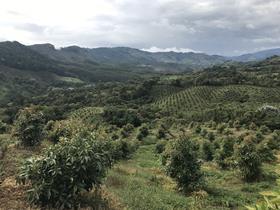
This will be the first time that the World Avocado Congress is held in Colombia. Why has it been decided that it will be the organising country in 2019?
Jorge Restrepo: Colombia has been lobbying hard to host the World Avocado Congress since it was held in Australia in 2011. Four years later, delegates at the WAC in Peru had the opportunity to vote on where the next event would be held and Colombia narrowly won over New Zealand. Medellín was selected as the host city due to its proximity to one of Colombia’s main avocado producing regions and also because of its excellent tourist infrastructure.
What are the main topics that will be covered by the congress programme?
JR: The congress covers very diverse topics but related to the Hass avocado industry that has been divided into six thematic areas: quality and safety; genetic resources and plant materials; production and productivity; plant health; supply chain marketing and processing; and health, nutrition and gastronomy.
Visitors to the congress will have the opportunity to experience Colombia’s avocado production first hand during a series of AvoTours. What defines and distinguishes the Colombian avocado industry and what can the participants learn from the tours?
JR: Colombia has a long tradition when it comes to producing avocados and they feature in many typical local dishes. But production has centred on green skinned varieties. Hass avocados were first planted around 20 years ago in response to international demand for this variety, making Colombia one of the few countries that produces this variety in tropical conditions. Visitors will therefore be able to observe that our weather patterns, plant growth cycles, farms, transport links and general agricultural culture are very different to those in more traditional origins of Hass avocados.
Global avocado production is growing at an impressive rate, and as a result, we’re seeing more overlaps between different supplier countries and regions. Do you think there is a need for greater collaboration between the different producing countries in areas such as production, information sharing and marketing to ensure a more orderly growth in the market?
JR: Many countries are planting more avocados to meet growing international demand, but it is the climatic conditions in each area that mainly affect the harvest seasons. Being in the tropics, the availability of water, sunlight and other factors allows Colombia to produce avocados throughout the year. So whenever we harvest, it will impact on other origins, which is why the most important thing is to invest in joint marketing campaigns to promote consumption and avoid the problem of falling prices when supply is at its highest.
Fortunately, avocado consumption is growing at a faster rate than production. Asia, in particular, has shown impressive growth in recent years and although markets such as China are still in their infancy, they have enormous potential given the size of their populations. What incursions has Colombia made in the region?
JR: Colombia can ship avocados to Hong Kong, but not yet to mainland China. However progress is being made in negotiating the phytosanitary protocols to open the Chinese market, as well as Japan and these, together with other markets, will allow us to reduce our high dependence on the European market.
Consumers want to buy fruits and vegetables that have been grown, packaged and shipped in a sustainable manner. At the same time, retail competition makes margins narrower and narrower. What challenges does this present for avocado companies?
JR: Precisely because Colombia is located in the tropics, this presents a series of specific sustainability challenges relating to deforestation, water consumption and environmental issues. At Corpohass we are continuously evaluating the environmental, social and economic impact of this nascent industry in order to ensure that we can grow sustainably in the future.
This is a challenge for the government, producers and the entire logistics, distribution and marketing chain.
One of the most positive aspects of the growth of Colombia’s avocado industry has been its ability to provide a profitable alternative for illegal crops like cocaine, and to enable the return of the population to the countryside after the displacement caused by years of armed conflict.
We believe that certification schemes such as Rainforest Alliance, GlobalGAP and Fairtrade have an important role to play in helping Colombian avocados to project a good image to the world.






No comments yet